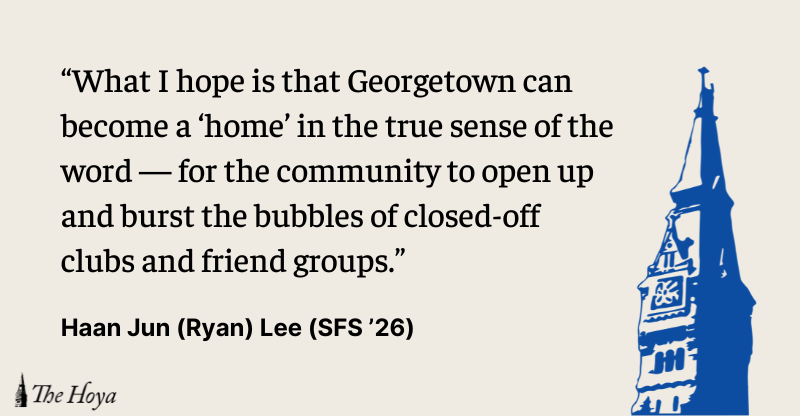As the academic year slowly comes to an end, I’ve found myself repeating “I miss home.” For some, this may be difficult to understand. After all, my friends have gone home or met their families in Washington, D.C., several times this year; they’re separated only by a train ride or a short flight.
But for me, home is a bit more complicated.
I was born in Seoul, South Korea, though I spent my childhood on the West Coast, attending elementary school in Southern California. I relocated to Jakarta, Indonesia, for high school, almost exactly halfway across the world from D.C.
And just as I tried to seek a home in all of these environments, I’ve tried to do the same here at Georgetown University. Yet, the more I try, I see the shortcomings that Georgetown has in creating a true sense of “home” and belonging for its students.
Georgetown has a campus culture issue, and students need to change the way that they interact.
When I introduce Georgetown to my friends from home or other outsiders, I first mention the fact that so many students here are politically involved. People aren’t afraid to voice their thoughts, with the hopes that they’ll contribute to a greater change. I find it symbolic of what Georgetown students embody: a will to become the world’s future leaders and innovators.
But as vocal as students are on grander issues in the world outside of Georgetown, I wonder how often they direct those voices inward to critically examine themselves. While they think about bigger goals and aspirations, I argue that they lose focus on the community surrounding them. Outside established cliques, student interactions are limited, and some are lost in their so-called “home” on the Hilltop.
The selective nature of clubs is an illustrative example. The high barrier of entry into certain groups fuels a cycle of exclusion: Those left out have far fewer opportunities for social interaction on a campus dictated by competitive “club culture.”
I recall the club application frenzy last fall, when I was a first-year just arriving at Georgetown. I had friends who stayed up until 3 a.m. filling out lengthy applications and preparing for several rounds of interviews conducted by their own classmates.
At the time, I didn’t see the value of putting in that much effort just to join a selective group. But I have since realized the influence that these selective clubs have on life at Georgetown. I remember when I first signed up for Hoya Gateway, a networking platform for Georgetown graduates, it asked me what clubs I was a part of, which caught me off-guard.
Everything from the social scene to professional graduate networking is influenced by what clubs a student joins, and clubs are a huge part of what shapes the individual Georgetown experience.
Ultimately, students are left with little room for choice: Clubs are so essential to campus life, yet their spots are often limited. This environment pits students against each other in a metaphorical “race” for the best personal statements, the most stellar resumes and unique interview responses. And for first-year students, this all happens one month into their time at Georgetown.
Students facilitate a campus culture where we sometimes forget that these “opponents” in the race are really just our peers. And amid the cliques and competition, the inclusive spirit of our institution is lost.
I don’t have a systematic solution for this — to offer a sweeping fix to this complex of a problem would be outrageous. Cultures don’t change overnight, and honestly, I see our campus culture as an unfortunate result of good intentions and applaudable ambitions.
But the agonizing lesson that I’ve now learned is that a simple interaction can go a long way. Anything can contribute to someone’s sense of belonging at Georgetown, whether that is offering a simple “hello” on the sidewalk or reaching out to an old acquaintance to catch up. Every interaction — and even the smallest of gestures — can start to shift the toxic culture that students have created here.
What I hope is that Georgetown can become a “home” in the true sense of the word — for the community to open up and burst the bubbles of closed-off clubs and friend groups.
Personally, I say this because I’m too far from my homes. All three of them are painfully far away. D.C. to Seoul is a 15-hour flight; Jakarta takes even longer; and my closest home, California, is still a cross-country flight away — and that’s not even mentioning how I haven’t lived there since fifth grade.
But even though my circumstances may be unique, I know I share a common belief with the rest of the student body: Georgetown is our home now. We spend the majority of the year on the Hilltop, surrounded by each other. This is where we live — no matter how far we’ve come to get here.
We’re all seeking a second home here. Let’s make it truly a “home” for all.
Haan Jun (Ryan) Lee is a first-year student in the School of Foreign Service.














